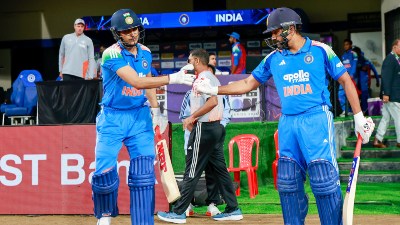Child-free Zone
8216;8216;BAIJU and I knew each other for 10 years before we got married. We studied together in the Goa College of Arts and came together...

8216;8216;BAIJU and I knew each other for 10 years before we got married. We studied together in the Goa College of Arts and came together as two individuals. Neither was expected to do any role-playing in this equation,8217;8217; says artist Vidya Kamat of her relationship with well-known painter Baiju Parthan. With the parameters clearly defined and respected, the question of having children was a non-issue for the artist couple.
Call it a child-free marriage, an Americanism rather happily accepted in urban Indian society. Not the concept, mind you, but the term. It doesn8217;t carry the baggage of childlessness, rather, it denotes an independent, voluntary decision, a refusal to be tied down to preconceived notions and expectations.
8216;8216;We decided well before marriage that we would not have children,8217;8217; say poet-writer Arundhati Subramanian, 35, and stage director-actor-ad filmmaker Vikram Kapadia, 41. 8216;8216;Most people tumble into matrimony like they go through school or get their degrees 8212; or have their children. It is regarded as inevitable, as if there is only one way of life and everyone has to stick to it. Such relationships are based on need, rather than want. There is a certain incompleteness and poverty in something so functional,8217;8217; adds Arundhati.
8216;8216;Besides, children are a lifetime commitment,8217;8217; says Vidya. 8216;8216;I personally think parenting is the most difficult of all jobs 8212; it means giving 100 per cent to the child.8217;8217;
For Baiju, too, the entire prospect of bringing up a child is frightening. 8216;8216;Parents bring up their children as if they were their mirror-images. They pass on everything they have, including their prejudices, knowledge and try to fit them in their own mould. A child is not an 8216;it8217;, children are persons, with their own complex realities. Children are so sensitive, like sponges that absorb all the perceptions around them. There is something dangerous about bringing up kids.8217;8217;
The painter8217;s reservations about bringing up a child may have something to do with his own childhood. 8216;8216;I grew up in an orthodox Keralite family where I was given the best of education, home, everything. But it was all lavished on me as an investment, something I would have to pay back. So when I didn8217;t reciprocate the way I was expected to, communication broke down.8217;8217;
Vidya has similar ideas. 8216;8216;I have never been able to resolve this myth of children growing up to live for their parents and act as a kind of buffer,8217;8217; she says.
Because of their clear thinking, the biological clock has never been an issue with either Arundhati or Vidya. 8216;8216;Neither of us believes that a woman needs to procreate to be complete,8217;8217; says Arundhati. 8216;8216;It may have something to do with the fact that both of us were brought up in liberal atmospheres, where we were encouraged to make our own decisions.8217;8217;
Coincidentally 8212; or perhaps not so coincidentally 8212; most of their friends, too, are child-free. 8216;8216;Children have only nuisance value,8217;8217; says Vikram unequivocally. 8216;8216;Every time I board the Rajdhani, there8217;s at least one child in my compartment. They create hell, especially at night, waking up everyone around them.8217;8217;
If Vikram and Arundhati have rarely faced raised eyebrows on their child-free status, Vidya and Baiju have often encountered questions. 8216;8216;Once in a medical emergency, I had to visit a doctor in Nalla Sopara. When the doctor came to know we don8217;t have children, he became furious and actually drove us away, calling us irresponsible people!8217;8217; laughs Vidya.
For both couples, the decision not to have children was a way of unlearning a deep conditioning. 8216;8216;How you define life depends on how you express it,8217;8217; says Baiju. Explains Vidya, who is also a Sanskrit scholar, 8216;8216;I have gone through innumerable texts, and they all say that women, willing or unwilling, have to produce children. Almost as if they are child-bearing machines. This notion is so deeply ingrained in the Indian psyche.8217;8217;
Vikram has the final word in the discussion. 8216;8216;Having or not having children is a choice that should have mattered some 2,000 years ago. The world is not as natural as it was 2,000 years ago. It is a much more complicated planet now.8217;8217;
And if they wish to exercise their choice now, who can argue?
- 01
- 02
- 03
- 04
- 05






























